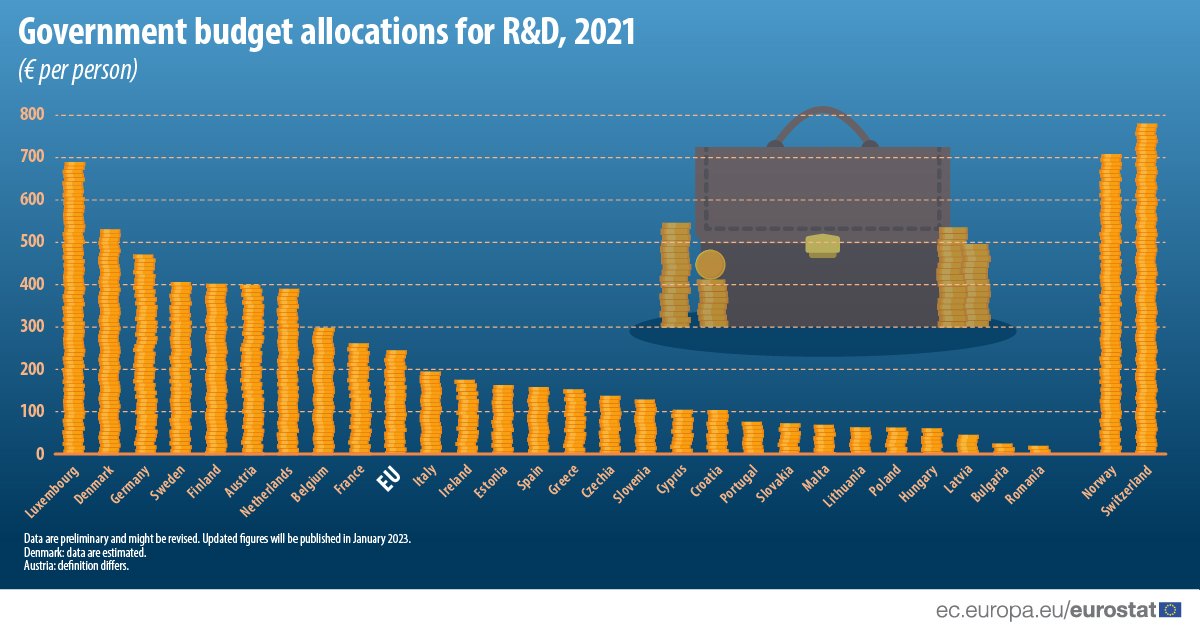Thessaloniki gets ready for its metro launch in November
The underground rapid transit lines have been under construction for almost two decades due to various project delays
 TheMayor.EU logo
TheMayor.EU logo According to Eurostat data, countries that spend less than the EU average, have grown their budgets the most in the last 10 years
Today, Eurostat published data on which countries in the EU invested the most in research and development in 2021. According to the research, Luxembourg is by far the leader per capita, sitting at 689 euros per inhabitant.
R&D is a very important facet of EU development, as it helps to strengthen the bloc’s competitive edge. In that regard, Eurostat points out that in many countries, R&D budgets have grown in the past 10 years, especially in countries that generally invest below the EU average.
At the same time, R&D investment in the entire block has grown to account for 0.75% of the EU’s total GDP, up from 0.72%. In absolute funding, however, the situation is a bit different, as in 2021 the bloc spent 244 euros per person, while in 2011, that number was 184 – showing an increase of 33%.
Luxembourg is followed by Denmark with 520 euros and Germany with 471 euros. At the same time, Romania invested the least, with 19 euros per person, preceded by Bulgaria (24.1 euros), Latvia (44.6 euros) and Hungary (59.8euros).
Yet, these numbers do not tell the whole story as many of the countries with the lowest comparative investments have made huge leaps in terms of the budget proportions that they allocate to the sector.
In Latvia, for instance, the total budget for R&D almost tripled, from 29.6 million to 84.3 million. It more than doubled in Greece (from 648.5 million to 1,623.4 million), Malta (from 14.4 million to 35.3 million) and Luxembourg (from 208.8 million to 437.4 million).

While there are many areas that use resources for research and development, Eurostat has focused on grouping them up into sectors. According to the data, there are five that dominate the budgetary agenda:


The underground rapid transit lines have been under construction for almost two decades due to various project delays

Now you can get your wine in Talence by paying directly in Bitcoin

That’s because the state has to spend money on updating the railway infrastructure rather than subsidizing the cost of the popular pass

Rethinking renewable energy sources for the urban landscape

The examples, compiled by Beyond Fossil Fuels, can inform and inspire communities and entrepreneurs that still feel trepidation at the prospect of energy transition

Now you can get your wine in Talence by paying directly in Bitcoin

The 10th European Conference on Sustainable Cities and Towns (ESCT) sets the stage for stronger cooperation between the EU, national and local level to fast track Europe's transition to climate neutrality.

At least, that’s the promise made by the mayor of Paris, Anne Hidalgo

The underground rapid transit lines have been under construction for almost two decades due to various project delays

At least, that’s the promise made by the mayor of Paris, Anne Hidalgo

Hostal de Pinós is located in the geographical centre of the autonomous region

Despite its church-y name, the district has long been known as the hangout spot for the artsy crowds

Urban dwellers across the EU are having a say in making their surroundings friendlier to people and the environment.

Forests in the EU can help green the European construction industry and bolster a continent-wide push for architectural improvements.

Apply by 10 November and do your part for the transformation of European public spaces

An interview with the Mayor of a Polish city that seeks to reinvent itself

An interview with the newly elected ICLEI President and Mayor of Malmö

A conversation with the Mayor of Lisbon about the spirit and dimensions of innovation present in the Portuguese capital














